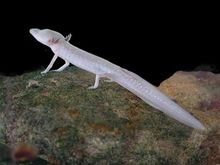Texan well newt
| Texan well newt | ||||||||||||
|---|---|---|---|---|---|---|---|---|---|---|---|---|

Texan fountain newt ( Eurycea rathbuni ) |
||||||||||||
| Systematics | ||||||||||||
|
||||||||||||
| Scientific name | ||||||||||||
| Eurycea rathbuni | ||||||||||||
| ( Stejneger , 1896) |
The Texan well newt ( Eurycea rathbuni ), also called Rathbunscher Brunnenmolch , is a blind cave dweller from the family of the lungless salamander (Plethodontidae) that only occurs in the US state of Texas . In appearance and way of life it is reminiscent of the European olm . The type epithet honors the American marine biologist Richard Rathbun (1852–1918).
features
The 8 to 13.5 centimeter long tailed amphibian is characterized by an elongated and flat head with a spatulate snout. The narrow, long limbs end in four toes at the front and five at the back. The tail is compressed laterally and tapers at the end. The trunk is segmented by 12 constrictions (ribs). The white skin has almost no pigments, the eyes are only rudimentary under the skin. The animal retains the bright red gills throughout its life (compare: neoteny ).
Occurrence, way of life
The Texan fountain newt lives aquatil only in the cave waters of the "Edwards Aquifer" in San Marcos in Hays County of Texas, especially in the so-called "San Marcos pool".
To search for food, the head is moved back and forth at the bottom of the water in order to tactilely prey on snails, crabs and other invertebrates .
Reproduction
The Texan well newt reproduces all year round. The female stimulates the male to mate by rubbing his chin on the male's back. If this behavior does not bring the male into a mating mood, the female uses methods such as scratching, nibbling or slapping the tail. The male lays the spermatophore on a stone and the female picks it up with his cloaca .
Danger
Due to its extremely limited range, this species is considered critically endangered. The Texan Well Newt needs the clean, cold water of the Edwards Aquifer. The pollution and overexploitation of drinking water reserves from the growing settlements in this area pose a threat to the species' survival.
Web links
- Texan well pig at animaldiversity.ummz.umich.edu (Engl.)
- Information about Edwards Aquifer at www.edwardsaquifer.net (Engl.)
- Eurycea rathbuni in the endangered Red List species the IUCN 2009. Posted by: Hammerson & Chippindale., 2004
